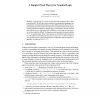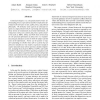855 search results - page 56 / 171 » Using First-Order Logic to Reason about Policies |
FOSSACS
2005
Springer
14 years 1 months ago
2005
Springer
Abstract. Nominal logic is a variant of first-order logic equipped with a “freshname quantifier” N and other features useful for reasoning about languages with bound names. I...
ATAL
2009
Springer
14 years 2 months ago
2009
Springer
Alternating-time temporal logic (atl) is one of the most influential logics for reasoning about agents’ abilities. Constructive Strategic Logic (csl) is a variant of atl for im...
POPL
2004
ACM
14 years 8 months ago
2004
ACM
We present a polynomial time randomized algorithm for global value numbering. Our algorithm is complete when conditionals are treated as non-deterministic and all operators are tr...
SP
2006
IEEE
14 years 1 months ago
2006
IEEE
Contextual integrity is a conceptual framework for understanding privacy expectations and their implications developed in the literature on law, public policy, and political philo...
POPL
2003
ACM
14 years 8 months ago
2003
ACM
We present a new polynomial-time randomized algorithm for discovering affine equalities involving variables in a program. The key idea of the algorithm is to execute a code fragme...


